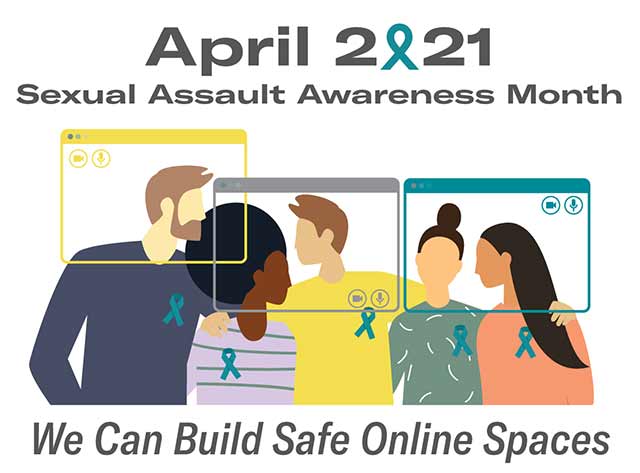
Though many think that sexual assault must include a physical act, recent stories like those of Harvey Weinstein and Jeffrey Epstein have helped us to understand that this serious crime comes in many different forms. This April, Sexual Assault Awareness Month is focused on building safe online spaces, where many sexual predators lurk unchecked.
Sexual assault and violence in any form is a subset of crimes posing a serious problem across the country. The Centers for Disease Control and Prevention reports that 43.6 percent of women1 and 24.8 percent of men2 in the United States have experienced some form of sexual violence. According to the Florida Department of Law Enforcement, in 2019, there were 8,439 rape offenses in Florida alone3.
Many people do not realize that sexual abuse can happen online as well as in-person. According to the National Sexual Violence Resource Center, some examples of online sexual abuse include:4
- Sending unwanted sexual comments
- Sending unwanted requests for nude photos, videos, or livestream of sexual acts
- Performing sexual acts on webcam without consent or in inappropriate settings
- Sharing private images or videos without consent (also known as revenge porn)
- Sharing porn in spaces without consent
- Grooming children to enable their sexual abuse. Grooming is when a sexual perpetrator tries to gain a child’s trust for the purpose of sexually exploiting them.
Any of these types of abuse can cause long-lasting emotional and psychological trauma. However, we can all take steps to help prevent online sexual abuse. Some ways that you can help are:
Community Level Prevention5
Leaders of online communities can:
- Create agreements that delineate the expectations about respectful communications for all participants.
- Develop a process for community victims to report harassment.
- Establish norms detailing appropriate and inappropriate forms of contact between community members (e.g. times of day to contact or which apps can be used for contact).
Preventing Online Sexual Abuse of Children6
- Educate children on what grooming is and how to recognize the signs of it.
- Listen to your child if they tell you that someone is making them feel uncomfortable online.
- Monitor the content that your children are accessing or have access to online.
- Contact the local authorities if you suspect someone is sexually abusing your child online.
Online sexual abuse is scary and can cause trauma that lasts a lifetime. If you are the victim of online sexual abuse, don’t suffer in silence. Contact the National Sexual Assault Telephone Hotline at 1-800-645-HOPE to be connected with someone in your local area who can help you.
Rader Law Group, LLC
With decades and decades combined experience, the attorneys at Rader Law Group understand the meaning of Justice. Our one and only mission is to get each client the justice he or she deserves; our team of attorneys never back down when we know our client is right.
We offer our clients the compassion and guidance they need as they work through trying times in their lives. The balance of working relentlessly for our clients combined with our caring approach has helped us achieve a fantastic record of success with our clients. We get our clients the justice they deserve.
At Rader Law Group, You matter. Your justice matters. Your Justice Starts Here. 954-913-2273
References:
1. Centers for Disease Control and Prevention. The National Intimate Partner and Sexual Violence Survey: 2015 Data Brief — Updated Release (cdc.gov). Page 2.
2. Centers for Disease Control and Prevention. The National Intimate Partner and Sexual Violence Survey: 2015 Data Brief — Updated Release (cdc.gov). Page 3.
3. Florida Department of Law Enforcement. Violent Crimes (state.fl.us)
4. National Sexual Violence Resource Center. Online Abuse and Trauma | National Sexual Violence Resource Center (NSVRC)
5. National Sexual Violence Resource Center. SAAM 2021 Online Community Prevention | National Sexual Violence Resource Center (NSVRC)
6. SAAM 2021 Keeping Kids Safe Online | National Sexual Violence Resource Center (NSVRC)
